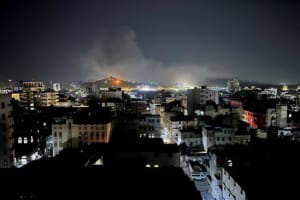Hezbollah claims response to killing of Fuad Shukr was ‘carried out with highest degree of accuracy and success’
Terror group says response was delayed due to 'political reasons'

The terrorist organization Hezbollah claims its response to Israel for the assassination of its top commander Fuad Shukr “was carried out with the highest degree of accuracy and success," according to the Hezbollah-affiliated Al-Mayadeen news site.
According to the report, Hezbollah’s attacks hit a military target “deep inside the occupation entity, not on its outskirts.” It further claimed that Israel’s air defenses were ineffective and “did not prevent any missile or drone from reaching its goal.”
Al-Mayadeen also denied Israel’s claim that the IDF's pre-emptive strike on rocket launchers was successful. The news site, which often functions as a mouthpiece for Hezbollah, stated that the IDF claims were intended for the Israeli public.
Al-Mayadeen claimed that Hezbollah explosive drones hit a “high-value military target” and cited a Hezbollah report that two military sites in central Israel were struck.
There were no reports of any strike on an Israeli military target from the IDF or in any Hebrew media outlet.
Furthermore, the report claimed that the launch of about 320 rockets was “supposed to distract from Iron Dome and Israel's response capabilities” in order to allow a hit on the military targets.
Israel Defense Forces reported a lower number, stating that about 210 rockets had been fired toward Israeli territory.
Hezbollah issued a statement declaring that it had concluded its response for the day to the killing of their military commander, Shukr, but indicated that further actions might follow, describing it as "an initial response."
The terror group also denied Israel’s claims to have disrupted its operation via pre-emptive strikes in southern Lebanon, saying the claims “contradict the facts on the ground and will be refuted.”
Hezbollah stated that Israel’s announcement of pre-emptive strikes was “an attempt to achieve an imaginary victory.”
Hezbollah’s leader Hassan Nasrallah will reportedly make a speech later today providing evidence of the group’s successful attacks on military targets and refuting the IDF’s claims of preventing a major attack.
“The enemy's false claims of preventive action will be refuted in a speech by Secretary General Nasrallah later in the day,” the group said in a statement.
🚨 Hezbollah: The initial phase of retaliation targeted Israeli military bases and barracks for the assassination of Sayyed Fouad Shukr and civilian deaths in southern Beirut. #Lebanon 🇱🇧 🔥 pic.twitter.com/XJbnl3Vqug
— Mohamad Al Shami محمد الشامي 🇾🇪🇵🇸 (@mamashami) August 25, 2024
The terror group later released a propaganda video showing several IDF bases in the Upper Galilee which it claims were the targets of its strikes.
In addition, an official of the group told Reuters that the response for the killing of Shukr was delayed by “political considerations,” these mainly being the ongoing hostage deal negotiations between Israel and Hamas.
The official did not explain why Hezbollah decided to strike on Sunday morning, just several hours before a summit in Cairo to continue the talks was set to start.
He further claimed that Hezbollah's attack was calculated so as not to provoke a full-scale war.
According to the IDF's official statement, only around 210 rockets and 20 drones were launched from Lebanon at northern Israel in Hezbollah’s attack this morning.
The IDF initially withheld statistics on the number of successful interceptions, indicating its reluctance to share intelligence that Hezbollah could use to enhance its attack strategies.
Local reports indicated that while some rockets were intercepted, others landed, causing damage and some injuries. Many rockets reportedly fell in open areas.

The All Israel News Staff is a team of journalists in Israel.
You might also like to read this:















